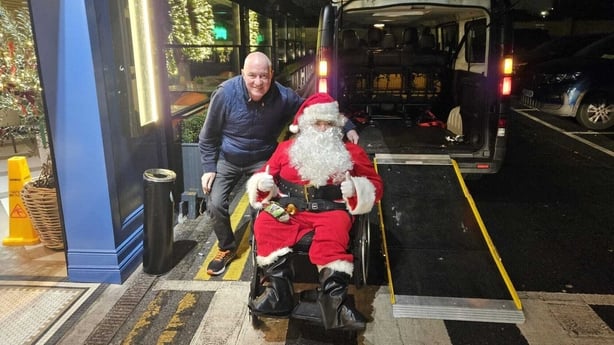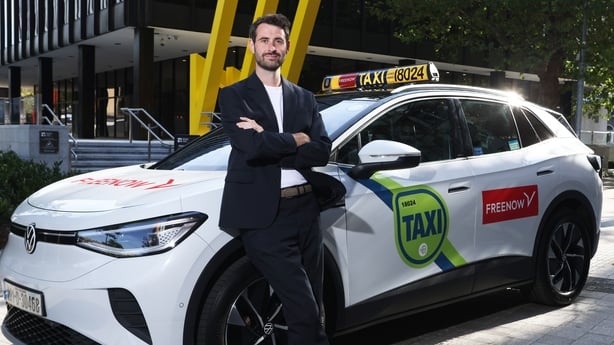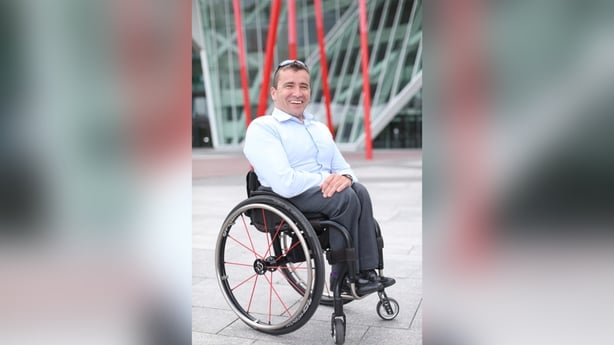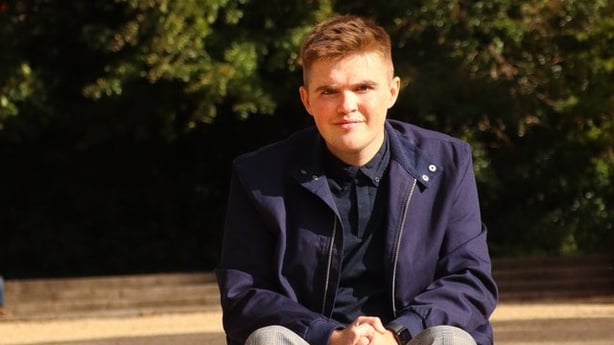Online applications for a grant available to taxi drivers to help purchase wheelchair accessible vehicles closed on Monday morning in less than 20 minutes.
Under rules introduced in 2010, new vehicle licenses are currently only available for wheelchair accessible taxis, which now make up 23% of the entire fleet in Ireland.
People who held taxi licences prior to the introduction of those rules can continue to use non-wheelchair accessible vehicles.
Taxi drivers around the country were left disappointed and have called for an overhaul of the ‘first come, first served’ process, drawing attention to the fact that people could apply for up to five grants at a time.
This number had been reduced from ten in previous years.
Taxi drivers said that accessing the portal at 10am was similar to trying to get tickets on Ticketmaster, with some reconsidering their role in the industry as wheelchair accessible vehicles are expensive to buy without the help of the grant.
Head of Public Affairs for the National Transport Authority (NTA) said that it received 2,000 applications on Monday morning for the Wheelchair Accessible SPSV Grant, at which stage the application process was closed.
“It will be reopening for another round in July,” said Dermot O’Gara.
Mr O’Gara said that the new rules around vehicle licenses were introduced in 2010 in “an effort to increase the accessibility of the fleet.”
The NTA increased the maximum WAV Grant level from €7,500 to €17,500 in 2023 “in response to changing vehicle prices.”
He said the NTA had informed drivers about the date and process in December and that new licence holders may choose to licence new wheelchair accessible taxis or hackneys without grant assistance.
Last year, 346 new such licences were added to the fleet without grant aid, compared to 372 which were grant aided.
The NTA said it revised the grant scheme for wheelchair accessible vehicles “in response to industry feedback”, increasing the time applicants had to complete the grant process and providing two opportunities for applying – January and July.
‘We tried and we tried’
Veteran taxi driver Gerry Kealy was one of the people who missed out on Monday.
He does a lot of work for nursing homes in Co Kildare.
Mr Kealy and his wife were online waiting to apply for the grant before the portal opened at 10am.
“When we couldn’t get in at around 10:05am, I rang NTA,” he said.
“Nothing was happening on the computer. We tried and tried.
“When we got through eventually, it said it was closed. It was all done.”
Mr Kealy has been driving taxis since the 1990s and said the prices for wheelchair accessible taxis have skyrocketed.
“We are trying to provide a service that is vital to wheelchair users.”
He is now reassessing his options as he is nearing retirement, stressing that renting a vehicle is not an economically viable option for most.
“Time is against me,” he said.
“It’s the only way that you can get your own taxi plate,” said Mr Kealy.
“Lads could get multiple applications. Was it just a case that lads who did get on just got five applications apiece?”
Ciarán Kenny said he is “leaving the business” after being denied grant funding.
He said he has been transporting wheelchair users from St Michael’s House for 24 years and mainly works with services for people with disabilities.

His first application went through on Monday but was refused because his license number was in the “wrong box”.
He said his second application was “too late”.
“My license is up this year but I have no choice,” said Mr Kenny.
“I had a new van ordered waiting to be cleared by customs and it was delayed [by Holyhead closure].
“My grant funding [for 2024] ran out in December. I got badly done.”
Mr Kenny said that renting a vehicle is not an option for him.
“They charge a fortune. I have another year left on mine and then I’m gone.”
Niamh Monks said her application was declined because she left out the W in front of her roof sign number.
“It’s a disgraceful way that they are doing business,” she said.
“A company can get on and ask for five new plates, get five new plates and then rent them for €400 per week.”
She said she cannot upgrade her wheelchair accessible taxi without the help of the grant.
“We are trying to provide a service that is vital to wheelchair users.”
One of the lucky ones
Meanwhile, Keith Mooney said he was one of the “lucky ones” who got an email saying his application was received before it “closed off.”
The Dublin taxi driver said: “I applied yesterday morning when it went live.
“Within 19-20 minutes, it was gone.
“I know people who tried to get through and just weren’t able to get through to the site at all.
“The cost of the vehicle I am looking at is close to €80,000 and the grant that is available there is €17,500.
“The price of the vehicles are very high at the moment.”
Mr Mooney received the grant in 2023 also and has received training from the Irish Wheelchair Association on how to operate a wheelchair accessible vehicle.
“It sold out as quickly as some of the most popular gigs.”
He said drivers must complete the training in order to receive the funding.
“It gives you an insight into what it’s like to be a wheelchair user, sitting in the back of a taxi,” he said.
A taxi driver who asked not to be named said the process was like “applying for Oasis tickets.”
“An individual could apply for up to five licenses and that would soak up all the money pretty quickly and that’s what happened,” he said.
“It was not in any way beneficial to people with disabilities.”
FreeNow calls for expansion of scheme
Taxi app FreeNow has called for an expansion of the scheme to help more taxi drivers buy or convert accessible vehicles and continue to improve accessibility.
General Manager Danny O’Gorman said that taxi drivers around the country were left disappointed by the process.

“It sold out as quickly as some of the most popular gigs,” he said.
“The demand is outstripping the supply.”
The app recently paired up with the IWA to raise funds through its ‘Round Up to Donate’ feature, with the difference going towards supporting IWA’s work.
Mr O’Gorman said an expansion of the grant is needed to grow its accessible taxi fleet and to ensure “those who require a wheelchair-accessible taxi can easily book one.”
He added: “We are committed to tackling mobility issues faced by wheelchair users and improving accessibility.”
Requirement to buy wheelchair accessible vehicle acts as a barrier – Uber
General Manager of Uber Ireland Kieran Harte said the requirement to buy a wheelchair accessible vehicle is acting as a barrier for people who want to enter the industry.
Mr Harte added that it does not make economic sense for people who want to enter the industry on a part-time to purchase a wheelchair accessible vehicle.
“Wheelchair accessible vehicles without the grant are quite expensive and they have to be a specific type.
“It’s the only way a lot of people can enter the industry.
“There is huge demand of people who want to enter the industry.”
Mr Harte said Uber wants to grow the number of wheelchair accessible vehicles, but stressed that the current system has its flaws.

“The big challenge is that unfortunately that money is just going into vehicles.
“It does nothing to oblige the driver to prioritise wheelchair passengers.”
He said that over 20% of Uber’s fleet in Ireland is wheelchair accessible which is “higher than any other market we have looked at in Europe.”
However, he said wheelchair users are still facing reliability issues.
“They are not getting these vehicles any easier than they did years ago.”
Wheelchair users still left waiting for taxis
Meanwhile, wheelchair users say that the WAV funding does not guarantee that drivers will take their fares, with many still being discriminated against despite the number of wheelchair accessible vehicles on the road.
Head of Communications for the Irish Wheelchair Association said “a broader approach from Government is needed in order to reduce people with disabilities usage of taxis”
Pamela Kavanagh said that “expensive” taxis are often the only option available to people with disabilities as there are often “little or no public transport alternatives.”
John Fulham is a member of the association’s advocacy and taxi advisory teams.
“There have been times when drivers have pulled up, seen the wheelchair and then cancel.”
The wheelchair user said the IWA fully supports the requirement to have wheelchair accessible taxis as “there is a difficulty for people with a disability in getting wheelchair accessible taxis.”
“The more of them we have in the system, the better,” said Mr Fulham.

He said that he has been left stranded while waiting on a taxi and that more steps need to be taken.
“It’s a problem we are aware of.
“We have looked at how we can change driver behaviour.
“For some of the app providers, they are looking at ways to incentivise their drivers per trip.”
He encouraged wheelchair users to report incidents where taxi drivers do not take their fares or pass them on the street, so that it does not happen to others.
“Often taxi drivers take an alternative fare or drop the booking in favour of one that they perceive as being more convenient and less of a hassle,” he said.
“There are other signs where taxis just don’t show up or they will pass you on the street.”
Mr Fulham said that taxis are a lifeline for people wanting to live independent lives.
“People with disabilities will use taxis for getting to medical appointments, getting to work and just living their lives.”
Wheelchair user Daniel Airey said the demand for wheelchair taxis was “not surprising.”
The Dublin man said that demand for the grant was “promising because it shows an appetite for accessibility” but stressed that wheelchair users often have to fight for their rights.
Conor McAuley, 23, also said that the taxi services available for wheelchair users are sub-par.
The young disability advocate has Duchenne Muscular Dystrophy and has seen first-hand how difficult it can be to order a wheelchair accessible vehicle, particularly outside of Dublin.
“There have been times when drivers have pulled up, seen the wheelchair and then cancel,” he said.

“In Ireland, the problem is all the vehicles are different, so you don’t know what you are going to get.
“There have been times where they have tried putting in my chair, but my chair isn’t suitable for that vehicle.
“There have also been times where I have been waiting for a taxi for ages.”
He said that the problem is even worse outside of the capital and expressed his worries that taxi drivers are taking advantage of the grant scheme.
“I’d like to see the vehicles being used for their intended purpose,” he said.
“I think it has been handled really badly as I see more wheelchair taxis but drivers still won’t take wheelchair users or show up, see you’re in a chair and cancel the booking.”
